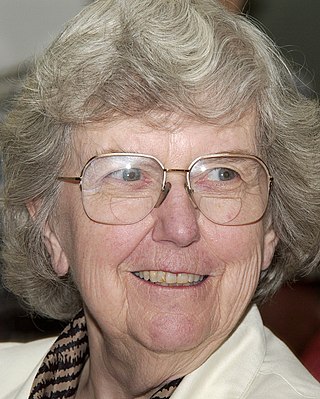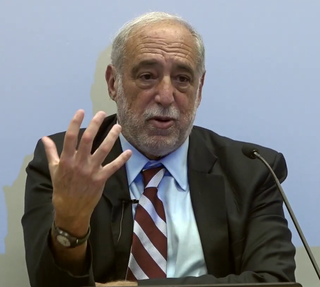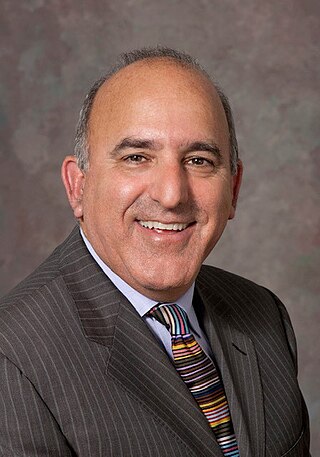
The National Childhood Vaccine Injury Act (NCVIA) of 1986 was signed into law by United States President Ronald Reagan as part of a larger health bill on November 14, 1986. NCVIA's purpose was to eliminate the potential financial liability of vaccine manufacturers due to vaccine injury claims to ensure a stable market supply of vaccines, and to provide cost-effective arbitration for vaccine injury claims. Under the NCVIA, the National Vaccine Injury Compensation Program (NVICP) was created to provide a federal no-fault system for compensating vaccine-related injuries or death by establishing a claim procedure involving the United States Court of Federal Claims and special masters.
Neal A. Halsey is an American pediatrician, with sub-specialty training in infectious diseases, international health and epidemiology. Halsey is a professor emeritus of international health and director emeritus of the Institute for Vaccine Safety at the Johns Hopkins Bloomberg School of Public Health, in Baltimore, Maryland. He had a joint appointment in the Department of Pediatrics at the Johns Hopkins School of Medicine and serves as co-director of the Center for Disease Studies and Control in Guatemala.

Mary Ellen Avery, also known as Mel, was an American pediatrician. In the 1950s, Avery's pioneering research efforts helped lead to the discovery of the main cause of respiratory distress syndrome (RDS) in premature babies: her identification of surfactant led to the development of replacement therapy for premature infants and has been credited with saving over 830,000 lives. Her childhood, mentors, drive, and education inspired Avery to be the visionary that she was. In 1991 President George H.W. Bush conferred the National Medal of Science on Avery for her work on RDS.

Hattie Elizabeth Alexander was an American pediatrician and microbiologist. She earned her M.D. from Johns Hopkins University in 1930 and continued her research and medical career at Columbia-Presbyterian Hospital in New York City. Alexander became the lead microbiologist and the head of the bacterial infections program at Columbia-Presbyterian. She occupied many prestigious positions at Columbia University and was well honored even after her death from liver cancer in 1968. Alexander is known for her development of the first effective remedies for Haemophilus influenzae infection, as well as being one of the first scientists to identify and study antibiotic resistance. She has received many awards and honors including the E. Mead Johnson Award in 1942, for her headway in pediatric research and antibiotic resistance. Alexander's research and studies helped lay the ground work for research into antibiotic and vaccine development.

Hepatitis B vaccine is a vaccine that prevents hepatitis B. The first dose is recommended within 24 hours of birth with either two or three more doses given after that. This includes those with poor immune function such as from HIV/AIDS and those born premature. It is also recommended that health-care workers be vaccinated. In healthy people, routine immunization results in more than 95% of people being protected.
Robert Martin Jacobson is the medical director of the Population Health Science Program of the Robert D. and Patricia E. Kern Center for the Science of Health Care Delivery. He is a previous chair of the Department of Pediatric and Adolescent Medicine at the Mayo Clinic and a full professor of pediatrics at the Mayo Clinic School of Medicine in Rochester, Minnesota. He still regularly sees young patients as a member of the Division of Community Pediatric and Adolescent Medicine. His research area is in vaccinology, with a focus on delivery, effectiveness, and adverse consequences. He is also involved with the Clinical Research Training Program in the Mayo Clinic School of Medicine, where he concentrates on teaching evidence-based medicine.

Barry S. Zuckerman is Professor and Chair Emeritus of the Department of Pediatrics at Boston University School of Medicine/Boston Medical Center. He started the Division of Developmental and Behavioral Pediatrics at the Boston University School of Medicine and Boston City Hospital and was one of 12 founders of the Society of Developmental and Behavioral Pediatrics. He was appointed chair of Pediatrics in 1993 and was asked to be First Medical Director of Boston Medical Center when Boston City Hospital merged with University Hospital. He is a co-founder of Reach Out and Read, a national childhood literacy program in the United States, founder of Medical-Legal Partnership, and co-founder of Health Leads, Healthy Steps, and the Nutrition & Fitness for Life pediatric obesity program, all of which have transformed pediatric care for low-income families. Most recently, along with colleagues, he developed a free app for pediatric primary care called "Small Moments, Big Impact" to promote the mother-infant relationship and emotional well-being for low-income mothers from birth through the first six months of their baby's life.

Jane Aronson, D.O. is an osteopathic physician, with expertise in pediatric infectious diseases and adoption medicine.

Katherine "Kate" L. O'Brien is a Canadian American pediatric infectious disease physician, epidemiologist, and vaccinologist who specializes in the areas of pneumococcal epidemiology, pneumococcal vaccine trials and impact studies, and surveillance for pneumococcal disease. She is also known as an expert in infectious diseases in American Indian populations. O’Brien is currently the Director of the World Health Organization's Department of Immunization, Vaccines and Biologicals.
Mildred T. Stahlman is an American neonatologist and academic. She worked as a professor of pediatrics and pathology at Vanderbilt University in Nashville, Tennessee.
Catherine D. DeAngelis is the first woman and the first pediatrician to become editor of the Journal of the American Medical Association (JAMA). She has also edited several additional medical journals. Before assuming the editor's position at JAMA in 2000, DeAngelis was a professor and Vice Dean of Faculty at the Johns Hopkins School of Medicine.

Barbara Starfield was an American pediatrician. She was an advocate for primary health care worldwide. Her academic and professional life was almost fully dedicated to the Johns Hopkins University.
Frank DeStefano FACPM is a medical epidemiologist and researcher at the Centers for Disease Control and Prevention, where he is director of the Immunization Safety Office.
Walter A. Orenstein is the former director of the United States' National Immunization Program, a post he held from May 1993 to January 2004.

Diana W. Bianchi is an American medical geneticist and neonatologist noted for her research on fetal cell microchimerism and prenatal testing. She is the director of the Eunice Kennedy Shriver National Institute of Child Health and Human Development, part of the National Institutes of Health. Bianchi had previously been the Natalie V. Zucker Professor of Pediatrics, Obstetrics, and Gynecology at Tufts University School of Medicine and founder and executive director of the Mother Infant Research Institute at Tufts Medical Center. She also has served as Vice Chair for Research in the Department of Pediatrics at the Floating Hospital for Children at Tufts Medical Center.
Ellen Wright Clayton is an American Rosalind E. Franklin Professor of genetics and chairwoman of the Institute of Medicine Board at the Population Health and Public Health Practice who became a 2013 recipient of the David Rall Medal.
Yvonne "Bonnie" Maldonado is an American physician, pediatrician, and Professor of Pediatrics and of Health Research and Policy at Stanford University, with a focus on Infectious Diseases. She founded Stanford's pediatric HIV Clinic and now serves as Stanford University School of Medicine's Senior Associate Dean of Faculty Development and Diversity.

Nathan Kuppermann is an American pediatrician and emergency physician who is a member of the National Academy of Medicine. He serves as a distinguished professor in the Departments of Emergency Medicine and Pediatrics at the UC Davis School of Medicine, educating future physicians about the fields he is adept in. Additionally, he holds the esteemed Bo Tomas Brofeldt Endowed Chair in emergency medicine. Dr. Kuppermann has made many notable contributions as the founding chair of the Pediatric Emergency Care Applied Research Network (PECARN), and subsequently as the chair of the global Pediatric Emergency Research Network (PERN). His contributions to pediatric emergency research and care highlights his dedication to improving the well-being of young patients across the world.
Penny M. Heaton is an American physician who is the Global Therapeutics Lead for Vaccines at Johnson & Johnson. She previously worked at Novavax, Novartis and the Bill & Melinda Gates Foundation. She was included by Stat News on their definitive list of leaders in the life sciences in 2022.
Tara Olive Henderson is an American pediatric oncologist. As the Arthur and Marian Edelstein Professor in the Department of Pediatrics, she is also the Director of the Childhood Cancer Survivor Center, Director of Survivorship at the University of Chicago Comprehensive Cancer Center, and chief of Pediatric Hematology and Oncology at the University of Chicago.









